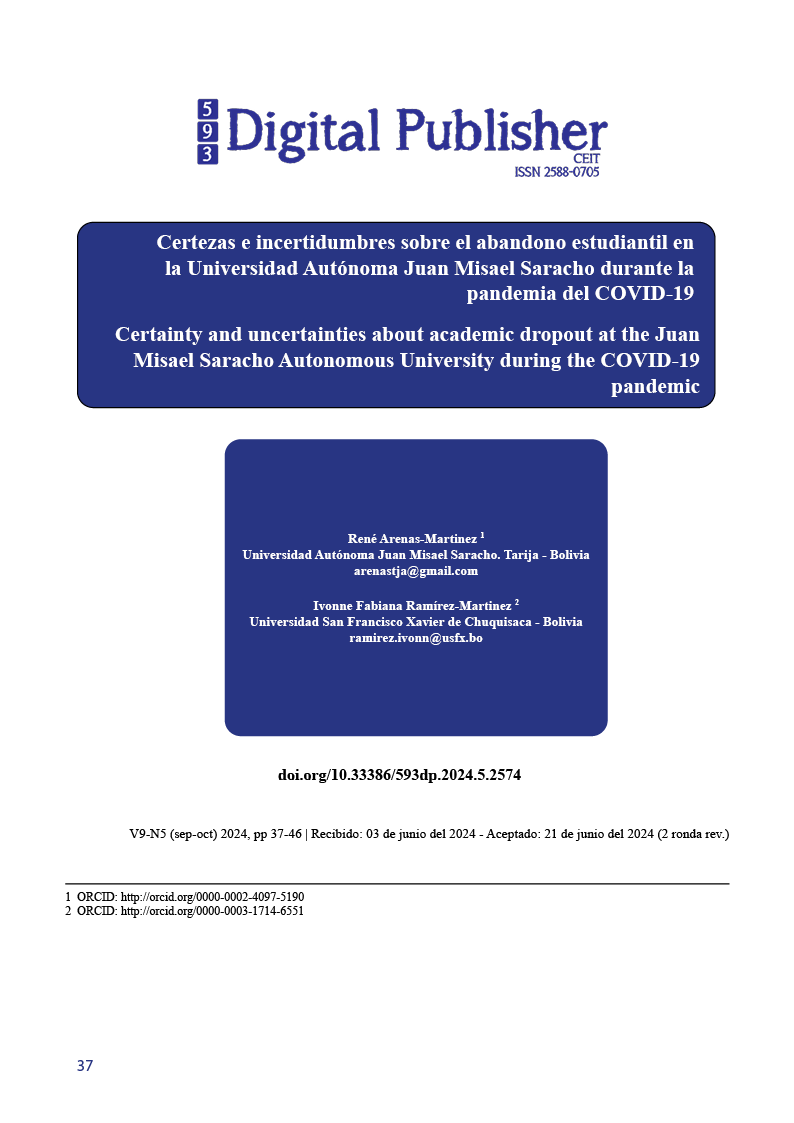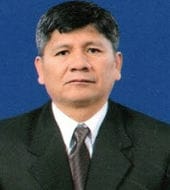Certainty and uncertainties about academic dropout at the Juan misael Saracho Autonomous University during the covid 19 pandemic
Main Article Content
Abstract
The transition from face-to-face classes to virtual classes in higher education caused by the COVID 19 pandemic produced a sudden change in the teaching and learning process, both teachers and students had to adapt to this new educational scenario. One of the aspects that was interesting to know during this transition period was related to how the students dropped out. Therefore, the objective of this study was to reflect on the certainties and uncertainties generated about the dropout of students at the Juan Misael Saracho Autonomous University during this pandemic period. The study was based on the review of scientific articles referring to the following educational categories: complexity of education, the educational transition from face-to-face to virtual classes, virtual education as an alternative to the pandemic, evaluation during virtual classes, the student dropout and the analysis of student dropout data in the period 2018 - 2022. The results show that during the transition period there were several factors that influenced the dropout percentage of students; the complexity of the education process, the lack of teacher training for the use of ICT, the flexibility in the educational evaluation of the knowledge acquired by students, the digital skills of students, and access to the internet and availability of equipment for access classes that caused an increase in the dropout rate at the beginning of the pandemic (2020), but decreasing the following year (2021).
Downloads
Article Details

This work is licensed under a Creative Commons Attribution-NonCommercial-ShareAlike 4.0 International License.
1. Derechos de autor
Las obras que se publican en 593 Digital Publisher CEIT están sujetas a los siguientes términos:
1.1. 593 Digital Publisher CEIT, conserva los derechos patrimoniales (copyright) de las obras publicadas, favorece y permite la reutilización de las mismas bajo la licencia Licencia Creative Commons 4.0 de Reconocimiento-NoComercial-CompartirIgual 4.0, por lo cual se pueden copiar, usar, difundir, transmitir y exponer públicamente, siempre que:
1.1.a. Se cite la autoría y fuente original de su publicación (revista, editorial, URL).
1.1.b. No se usen para fines comerciales u onerosos.
1.1.c. Se mencione la existencia y especificaciones de esta licencia de uso.
References
Álvarez, P. R. y López, D. (2021). El burnout académico y la intención de abandono de los estudios universitarios en tiempos de COVID-19. Revista Mexicana de Investigación Educativa. 26(90), 663-689. https://www.scielo.org.mx/pdf/rmie/v26n90/1405-6666-rmie-26-90-663.pdf
Arévalo, A. (2022). La docencia universitaria en tiempos del COVID-19: un estudio mediante grupos de discusión. Tercio Creciente, N° 22. 237- 256). https://dx.doi.org/10.17561/rtc.22.6516
Comité Ejecutivo de la Universidad Boliviana (CEUB), (2015). Modelo académico del sistema de la universidad boliviana. https://es.scribd.com/document/369444281/Ceub-Modelo-Academico-Sub
Cruz, B. V. (2020). Desafíos y oportunidades de la educación en línea en el contexto de la pandemia de COVID-19. Revista Polo de Conocimiento. 5(51), 394-404. https://polodelconocimiento.com/ojs/index.php/es/article/view/1946/3848
Filippi, J.L., Lafuente, G., Ballesteros, C. y Bertone, R. (2021). Evaluación de los aprendizajes en periodo de pandemia. Revista Iberoamericana de Tecnología en Educación y Educación en Tecnología, N.° 28, 396-402. https://doi.org/10.24215/18509959.28.e49
Giraldo, G. (2005). Teoría de la complejidad y premisas de legitimidad en las políticas de educación superior. Cinta de Moebio 22: 46-72. www.moebio.uchile.cl/22/giraldo.html
González, G.I., (2021). La realidad como mito: el contexto de las universidades ante la complejidad posmoderna. Diálogos sobre Educación. 12(22), 1- 25. DOI: https://doi.org/10.32870/dse.v0i22.910
López, N.E., Castro, C.P. y Arguello, M.M. (2021). Relación entre el ambiente universitario y la permanencia y abandono estudiantiles. X CLABES, Congreso Latinoamericano sobre el Abandono en la Educación Superior. Medellín, Colombia. https://revistas.utp.ac.pa/index.php/clabes/article/view/3440/4125
Lovón, M.A., y Cisneros, S.A. (2020). Repercusiones de las clases virtuales en los estudiantes universitarios en el contexto de la cuarentena por COVID-19: El caso de la PUCP. Propósitos y Representaciones, 8 (SPE3), e588. http://dx.doi.org/10.20511/pyr2020.v8nSPE3.588
Maldonado, C. E., (2014). ¿Qué es eso de pedagogía y educación en complejidad? Intersticios Sociales, (7), 1-23. https://www.redalyc.org/comocitar.oa?id=421739500002
Michel, L.T., Fernández, A.M., Betancourth, S. y Gómez, Y.A. (2021). Deserción en la población estudiantil universitaria durante la pandemia, una mirada cualitativa. Revista Virtual Universidad Católica del Norte, (66), 37-62. https://doi.org/10.35575/rvucn.n66a3
Miño, M. E. (2021). Factores condicionantes de la deserción universitaria. Ciencia Latina Revista Científica Multidisciplinar, 5(4), 5316-5328. https://doi.org/10.37811/cl_rcm.v5i4.691
Miño, M. E. (2021). Factores condicionantes de la deserción universitaria. Ciencia Latina Revista Científica Multidisciplinar, 5(4), 5316-5328. https://doi.org/10.37811/cl_rcm.v5i4.691
Moraes, M.C. (2007). Complejidad, transdisciplinariedad y educación: Algunas reflexiones. Encuentros Multidisciplinares. 9(25), 4 -13. http://www.encuentros-multidisciplinares.org/Revistan%BA25/Mar%EDa%20C%E1ndida%20Moraes.pdf
Paz, H. R. (2022). Determinación del tiempo medio de deserción y de los factores que facilitan o retrasan la deserción estudiantil en una carrera de Ingeniería civil. Revista Latinoamericana de Políticas y Administración de la Educación (RELAPAE). 17(9), 99 -116. http://revistas.untref.edu.ar/index.php/relapae/article/view/1468/1322
Pillajo, H. G. y Sierra, P. X. (2022). El impacto de la educación virtual en la Universidad durante el Covid-19. Revista Vínculos ESPE, 7(2), 91–106. https://doi.org/10.24133/vinculosespe.v7i2.2536
Ramos, V., García, H., Olea, C., Lobos, K. y Sáez, F. (2020). Percepción profesor respecto al trabajo pedagógico durante la COVID-19. Revista CienciAmerica. 9(2). http://dx.doi.org/10.33210/ca.v9i2.325
Umaña, A., C. (2020). Educación Superior en tiempos de COVID-19: oportunidades y retos de la educación a distancia. Innovaciones Educativas. 22, 36 – 49. https://doi.org/10.22458/ie.v22iespecial.3199
Universidad Autónoma Juan Misael Saracho, Secretaria de Desarrollo Institucional. (2022). Estadísticas universitarias 3017 – 2021. https://www.uajms.edu.bo/dpu/estadisticas-universitarias/#
Vargas, X. (2011). ¿Cómo hacer investigación cualitativa? Una guía práctica para saber qué es la investigación y cómo hacerla, con énfasis en las etapas de la investigación cualitativa. Editorial ETXETA. http://www.paginaspersonales.unam.mx/files/981/94805617-Xavier-Vargas-B-COMO-HACER-INVESTIGA.pdf.
Vasilachis, I. (Coord.) (2006). Estrategias de investigación cualitativa. Editorial GEDISA. http://investigacionsocial.sociales.uba.ar/wp-content/uploads/sites/103/2013/03/Estrategias-de-la-investigacin-cualitativa-1.pdf.



